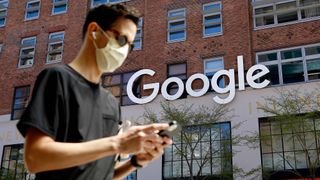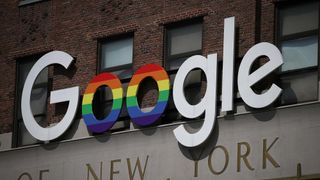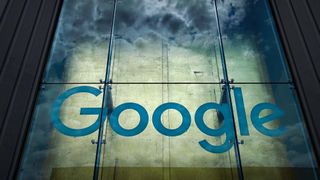Hey Google, Congress needs to do more to rein in the tech industry, not less
Opinion: company's new defense doesn't do what it thinks it does

Kent Walker, President of Global Affairs and Chief Legal Officer for Google and parent company Alphabet, wrote a long blog post this week that argues that the "anti-tech" bills the US Congress is considering threaten to break important Google services and literally threaten the health of the public. I'm not kidding.
There's a lot to unpack in the post, but Google's argument boils down to three essential points: US technological competitiveness, user security, and user experience.
The first is almost laughable as a defense once you take a moment to consider what Google is actually saying. Essentially, the argument goes that if Google needs to get permission from "government bureaucrats" (in other words, regulators looking out for the public interest) in order to launch new features or fix problems, it would put American companies at a competitive disadvantage against foreign companies.
What they really mean is Chinese companies, since only the state-aligned tech giants of China like Tencent have anywhere near the power of American tech companies, which should tell you a lot more about American tech than anything else.

The kicker is the argument that "Foreign companies could also routinely access American technology as well as Americans' data."
First, foreign companies routinely access American technology because American companies sell it to them. Huawei phones were running Android OS right up until Huawei got sanctioned by the US Government, let's not forget.
If Google is concerned about Chinese companies tearing down their products and reverse engineering them, well, that's been a part of business for as long as there has been business. If you want to avoid that, don't sell them your products. You don't get to have it both ways.
Get daily insight, inspiration and deals in your inbox
Get the hottest deals available in your inbox plus news, reviews, opinion, analysis and more from the TechRadar team.
Then, there's the argument that foreign companies can routinely access American's data, and so, presumably, restricting US tech companies' ability to do so puts US tech at a competitive disadvantage. In other words, Google is implicitly arguing for a race to the bottom on privacy protection against companies operating in authoritarian countries. No thanks.
The other two arguments need some further unpacking though, since they get to the heart of the anti-trust debate currently bubbling up in the tech world.
Will anti-trust legislation harm user security?

Google claims that it "is able to protect billions of people around the world from cyberattacks because we bake security and privacy protections into our services," and that "These bills could prevent us from securing our products by default, and would introduce new privacy risks for you."
Sounds ominous, but the examples Google cites don't do the legwork it things they do. First, "The bills could hamper our ability to integrate automated security features if other companies offer similar features. For example, we might be prevented from automatically including our SafeBrowsing service and spam filters in Chrome and Gmail to block pop-ups, viruses, scams and malware."
Notice that Google doesn't say that users will be necessarily be left vulnerable. This would only be an issue if someone else offered a similar service: in other words, competition. I thought competition was a good thing for innovation?
What about breaking apart the connections between Google services? Would this limit Google's ability to "detect and protect you against security risks that use security signals across our products"?

That is entirely possible, but Google does not say what kind of threats those are, and why they and they alone can prevent them. Couldn't a competing service actually be better at detecting these threats? Maybe, maybe not, but why does Google have the exclusive right to decide that question in its favor?
Google also says that "when you use Google Search or Google Play, we might have to give equal prominence to a raft of spammy and low-quality services." That's right, only the low-quality and spammy services and apps that pay Google advertising dollars are allowed to be displayed prominently.
What's more, this argument implicitly gives Google the right to determine whether an app or service is "low-quality". First, have you seen the Google Play marketplace? They are already failing on this front. What does low-quality mean to Google? Who knows, they get to decide that for us, and competing apps and services to Google's own products could suffer as a result.
The real kicker though is the claim that "These bills may compel us to share the sensitive data you store with us with unknown companies in ways that could compromise your privacy."
This is Google's entire business model in a nutshell. Google already does this, it's just that Google charges for access to that data. Also, "data you store with us" is a funny way to say "data we collect about your online activity," but I can see why they'd want to go with the former phrasing, rather than the latter.

Does anti-trust legislation break features that help customers and small businesses?
Google rightly notes that "When you come to Google Search, you want to get the most helpful results." That's why so many Google search requests return search results filled with ads above the fold of the search results page. But I digress.
"If you search for a place or an address," Google says, "we may not be able to show you directions from Google Maps in your results." Thanks Google! No one knew how to get anywhere before you integrated Google Maps into everything.
Google says that without Google Search and Maps integration, information about a local businesses Google collects might not "highlighted" in Search, like hours of operation, foot traffic, etc. This could hurt business and customers alike, but Google doesn't say how. Maybe they, too, are millennials who are too anxious to dial the listed phone number and ask what time the business closes. Whatever did we do before Google came along? We were such lost little lambs.
Likewise, if Gmail, Calendar, and Docs aren't integrated to work "seamlessly" businesses would suffer. Again, they don't provide any specifics of so onerous a situation that only tightly controlled integration between Google's services can solve the problem.
It's not about ensuring that a business is completely locked into its ecosystem of services and making them more money, they're doing this as a service to small businesses. Totally on the up and up.

Finally, there are some arguments Google deploys in its blog post that are genuinely...distasteful. "As just one example, if you search for 'vaccine near me,' we might not be able to show you a map of vaccine locations in your community."
Sure, that may be true, but you can also Google "vaccines 10036" or any other zip code and get the same information, which most people are going to do anyway. What's offensive about this is Google is deploying a public health crisis as an excuse to defeat antitrust regulation that may threaten its bottom line.
It does something similar when it says "When you have an urgent question — like 'stroke symptoms' — Google Search could be barred from giving you immediate and clear information, and instead be required to direct you to a mix of low quality results."
If Google wanted, it could ask that an exception be made in any anti-trust legislation for terms that might signal a health emergency—a carve-out that few, if any, legislators would be inclined to reject. The government already has tech companies label misinformation about Covid-19 in its results, so it's not like exceptions for safety reasons can't be made.
Instead, Google is using a particularly frightening edge case as an argument to defeat ongoing anti-trust effort. The suggestion here is you either let Google engage in its current business practices, which many legislators consider monopolistic, or you might not be immediately told that you or your loved one could be having a stroke and will have to wade through misinformation to figure it out on your own, which would sure be a shame. The gall is genuinely gobsmacking.
Google's defense of itself actually shows that it has invaded too far into everyday life

All you need to do is ask "What does Google do?" to see the problem. It's not one thing, its increasingly everything. It runs the vast majority of phone and tablets in the world. It is the world's largest search engine by miles. It is just about the only way you can ever get directions, it is how most of us communicate, and increasingly, it's how most of us conduct our daily business.
It is everywhere, and Google is saying that simply severing the connection between these services and allowing competition into the mix could break everything. If that is the case, then it is far too powerful to remain in one piece. No one company should have so much power over so much of what we do in our day-to-day lives, even down to knowing whether or not a loved one is having a stroke.
And it's not just Google. Facebo—I mean, Meta—wants to be the only way you connect and interact with friends and family. Amazon is increasingly the backbone of the entire internet, to the point where a server outage in one of its data centers can bring down thousands of apps and websites all at once.
Google's defense of its business practices, and those of the tech industry more broadly, does the exact opposite of what it intended. It lays out a convincing case for why it and every other tech behemoth needs to be checked by the only entity powerful enough to do so: the government. With every passing day, the tech industry is showing us that it clearly can't be trusted to do so of its own accord.

John (He/Him) is the Components Editor here at TechRadar and he is also a programmer, gamer, activist, and Brooklyn College alum currently living in Brooklyn, NY.
Named by the CTA as a CES 2020 Media Trailblazer for his science and technology reporting, John specializes in all areas of computer science, including industry news, hardware reviews, PC gaming, as well as general science writing and the social impact of the tech industry.
You can find him online on Threads @johnloeffler.
Currently playing: Baldur's Gate 3 (just like everyone else).
Most Popular

